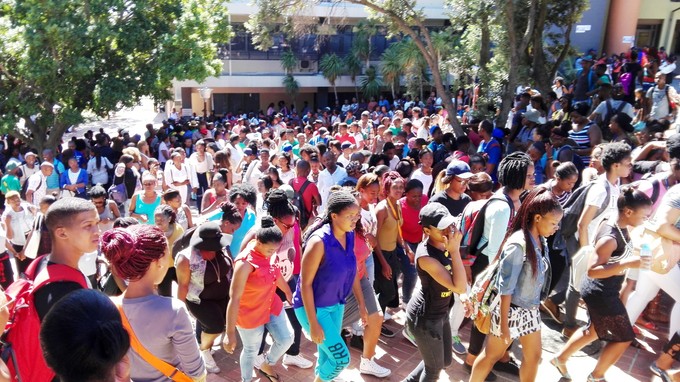
Students protested at the Cape Peninsula University of Technology, Cape Town campus. Photo by MasixoleFeni
16 March 2016
About 500 people chanted outside the administration office at the Cape Peninsula University of Technology (CPUT) Cape Town campus earlier today demanding the removal of the vice-chancellor.
The protest was organised by Pasma (Pan-African Student Movement of Azania), Sasco (South African Students Congress) and the SRC (Student Representative Council).
Aviwe Gwayi, Sasco secretary and member of the SRC, said the protest focused on many issues, but the ultimate aim was to get the vice-chancellor to step down.
“Basically this is our final week of registration we have been patient … we have exhausted all avenues and this is what it’s come to.”
He claimed thousands of students had not registered. He said students had to pay half of their debt in order to be able to register for free.
The University of Cape Town has come up with a plan to deal with the debt of students who were on financial aid in 2013, 2014 and 2015. Students may convert their debt into a NSFAS loan, meaning that they may register for the upcoming year. This is not the case for CPUT.
Gwayi said, “The other issue is the issue of residence. CPUT can only accommodate about 16% of the student population, which is lower than the mandate given by the Department of Higher Education, which is a minimum of 23%. We have students who are admitted into the institution, but are forced to go home because they do not have a place to stay.”
The Vice-Chancellor, Prins Nevhutalu, released a statement saying measures, like extra security, had been put in place to control the situation.
“I would like to make it very clear to staff and students that the entire institution remains open and we will not engage in any negotiations regarding this. The majority of classes across all major and satellite campuses continue uninterrupted.”
A court interdict which protects the safety of staff, students and property remains in place.
“CPUT respects the right of students to protest and we have also been given an undertaking that this protest will not be violent,” he said.
Gwayi said the SRC had taken a decision not to focus on racism and burning artworks in protest as had happened on other campuses. “We told ourselves as the SRC to not be excited by this but have our own agenda,” he said.